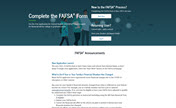Before completing your Free Application for Federal Student Aid (FAFSA), there is a new update you’ll want to review.
“The American Rescue Plan (ARP) Act was signed into law on March 11, 2021. The ARP made the first $10,200 of unemployment benefits non-taxable for each taxpayer with incomes less than $150,000. The untaxed portion of unemployment benefits increases to $20,400 for applicants who have a tax filing status of married-filing-jointly (if both tax filers received benefits).
FSA expects to see an issue with aid eligibility determination for some 2022-23 FAFSA filers as well as Income Driven Repayment applicants for whom loan payment amounts are based on 2020 tax information, even if the IRS DRT was used in either circumstance.
Tax filers who received unemployment benefits in 2020 and filed taxes prior to March 11, 2021, will have a higher Adjusted Gross Income (AGI) on their original tax record compared to those who filed (or amended) after the enaction of the ARP.
FAFSA filers who meet the conditions above and use the IRS DRT for the 2022–23 year will have a higher AGI, resulting in a higher EFC which may potentially reduce their eligibility for federal need-based aid.
Financial Aid Administrators are encouraged to work with applicants affected by the ARP who filed their taxes before March 11, 2021, to use professional judgement to adjust the applicant’s AGI (or the AGI of the applicant’s parents or spouse, if applicable) as appropriate.”
For more information, visit https://fsapartners.ed.gov/knowledge-center/library/electronic-announcements/2021-09-30/impact-american-rescue-plan-change-tax-treatment-unemployment-benefits-student-aid-eligibility-cycle-2022-23 or https://www.irs.gov/forms-pubs/new-exclusion-of-up-to-10200-of-unemployment-compensation.

